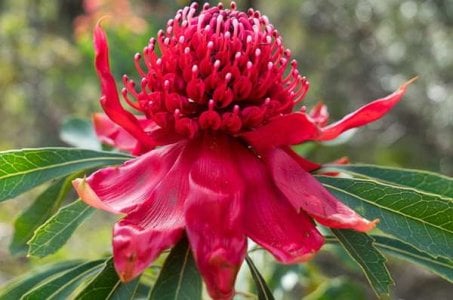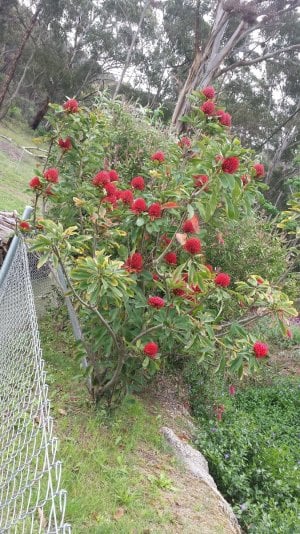Aussie national parks implement hefty fines for tourists stealing this flower
By
Danielle F.
- Replies 22
Australia is home to some of the world's most stunning landscapes and unique flora.
National parks have been sanctuaries for this natural heritage, as they offer a glimpse into the country's natural wonders.
However, a concerning trend recently emerged which threatened the very essence of these protected areas.
The waratah, New South Wales' state emblem and a symbol of Australian beauty, recently became the target of a 'surprising threat'—theft by visitors.
Apart from its vibrant crimson flowers, the waratah is also an integral part of the ecosystem.
Yet, authorities reported that these protected flowers have gone 'missing' from national parks, particularly from Brisbane Water National Park.
Over 20 waratahs recently vanished from the park, and it seems that tourists are to blame.
It's a selfish act that sparked a warning from the NSW National Parks and Wildlife Service (NPWS).
'It is illegal to pick waratahs or any other plant in any area protected under the National Parks and Wildlife Act,' an NSW NPWS spokesperson stated.
Rangers are ready to issue $300 on-the-spot fines. However, under the Biodiversity Conservation Act, the maximum fine could reach up to $22,000.
The NPWS urged anyone with information about these illegal activities to come forward.
In response to the thefts, NSW National Parks took several measures to deter would-be thieves.
Signages have been installed to educate visitors on the importance of protecting the waratah.
Some waratah stems have been marked with non-toxic blue paint.
'Waratahs need to go through their full lifecycle to produce seeds, so picking them deprives the ecosystem of a new generation of plants,' the NPWS spokesperson added.
These flowers are more than just beautiful flora—they provide essential nectar for birds and other native animals.
NSW National Parks also humorously suggested that if visitors feel the urge to pick something, they should instead opt for their nose instead of the flowers.
The local community also spoke about the destructive actions of picking waratahs.
Several locals expressed their disgust after someone picked off a rare 'double-header' waratah.
'Just went to check on a beautiful double header waratah in local bushland only to find someone, well prepared with their secateurs, has cut it clean off. Beyond disgusted!' environmental conservation organisation Wild Blue Mountains exclaimed on social media.
This issue is more than just about preserving the beauty of our national parks; it's about protecting natural ecosystems.
If you witness any illegal activity in our national parks—may it be picking out flowers otherwise—please report it to the authorities.
With your help, the waratah and other native plants can thrive for years to come.

Have you visited a national park recently and seen a waratah in its full glory? Have you encountered similar issues in your local park? Share your experiences and thoughts with us in the comments below.
National parks have been sanctuaries for this natural heritage, as they offer a glimpse into the country's natural wonders.
However, a concerning trend recently emerged which threatened the very essence of these protected areas.
The waratah, New South Wales' state emblem and a symbol of Australian beauty, recently became the target of a 'surprising threat'—theft by visitors.
Apart from its vibrant crimson flowers, the waratah is also an integral part of the ecosystem.
Yet, authorities reported that these protected flowers have gone 'missing' from national parks, particularly from Brisbane Water National Park.
Over 20 waratahs recently vanished from the park, and it seems that tourists are to blame.
It's a selfish act that sparked a warning from the NSW National Parks and Wildlife Service (NPWS).
'It is illegal to pick waratahs or any other plant in any area protected under the National Parks and Wildlife Act,' an NSW NPWS spokesperson stated.
Rangers are ready to issue $300 on-the-spot fines. However, under the Biodiversity Conservation Act, the maximum fine could reach up to $22,000.
The NPWS urged anyone with information about these illegal activities to come forward.
In response to the thefts, NSW National Parks took several measures to deter would-be thieves.
Signages have been installed to educate visitors on the importance of protecting the waratah.
Some waratah stems have been marked with non-toxic blue paint.
'Waratahs need to go through their full lifecycle to produce seeds, so picking them deprives the ecosystem of a new generation of plants,' the NPWS spokesperson added.
These flowers are more than just beautiful flora—they provide essential nectar for birds and other native animals.
NSW National Parks also humorously suggested that if visitors feel the urge to pick something, they should instead opt for their nose instead of the flowers.
The local community also spoke about the destructive actions of picking waratahs.
Several locals expressed their disgust after someone picked off a rare 'double-header' waratah.
'Just went to check on a beautiful double header waratah in local bushland only to find someone, well prepared with their secateurs, has cut it clean off. Beyond disgusted!' environmental conservation organisation Wild Blue Mountains exclaimed on social media.
This issue is more than just about preserving the beauty of our national parks; it's about protecting natural ecosystems.
If you witness any illegal activity in our national parks—may it be picking out flowers otherwise—please report it to the authorities.
With your help, the waratah and other native plants can thrive for years to come.
Key Takeaways
- Authorities warned against the illegal picking of waratahs, the NSW state emblem.
- Visitors who remove these protected native plants could face heavy fines. On-the-spot fines could cost $300 and could reach a maximum of $22,000 under the Biodiversity Conservation Act.
- NSW National Parks already installed signages and painted some waratah stems with non-toxic paint to deter thieves.
- Several environmental groups expressed their disgust at the selfish act of picking the waratahs, which could negatively impact local biodiversity.









